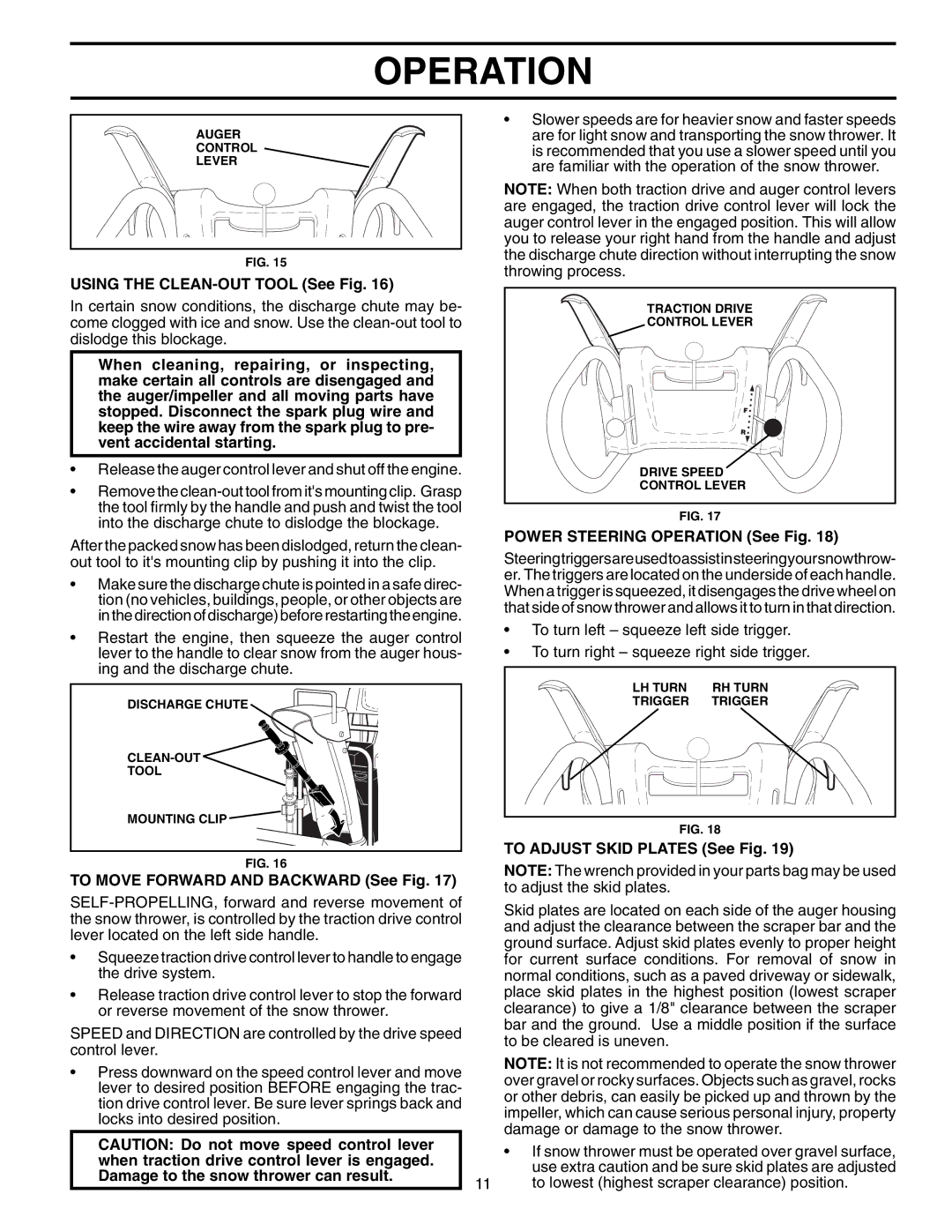
OPERATION
AUGER
CONTROL
LEVER
FIG. 15
USING THE CLEAN-OUT TOOL (See Fig. 16)
In certain snow conditions, the discharge chute may be- come clogged with ice and snow. Use the
When cleaning, repairing, or inspecting, make certain all controls are disengaged and the auger/impeller and all moving parts have stopped. Disconnect the spark plug wire and keep the wire away from the spark plug to pre- vent accidental starting.
•Release the auger control lever and shut off the engine.
•Remove the
After the packed snow has been dislodged, return the clean- out tool to it's mounting clip by pushing it into the clip.
•Make sure the discharge chute is pointed in a safe direc- tion (no vehicles, buildings, people, or other objects are in the direction of discharge) before restarting the engine.
•Restart the engine, then squeeze the auger control lever to the handle to clear snow from the auger hous- ing and the discharge chute.
DISCHARGE CHUTE
TOOL
MOUNTING CLIP
FIG. 16
TO MOVE FORWARD AND BACKWARD (See Fig. 17)
•Squeeze traction drive control lever to handle to engage the drive system.
•Release traction drive control lever to stop the forward or reverse movement of the snow thrower.
SPEED and DIRECTION are controlled by the drive speed control lever.
•Press downward on the speed control lever and move lever to desired position BEFORE engaging the trac- tion drive control lever. Be sure lever springs back and locks into desired position.
CAUTION: Do not move speed control lever when traction drive control lever is engaged. Damage to the snow thrower can result.
•Slower speeds are for heavier snow and faster speeds are for light snow and transporting the snow thrower. It is recommended that you use a slower speed until you are familiar with the operation of the snow thrower.
NOTE: When both traction drive and auger control levers are engaged, the traction drive control lever will lock the auger control lever in the engaged position. This will allow you to release your right hand from the handle and adjust the discharge chute direction without interrupting the snow throwing process.
TRACTION DRIVE
CONTROL LEVER
DRIVE SPEED
CONTROL LEVER
FIG. 17
POWER STEERING OPERATION (See Fig. 18)
Steeringtriggersareusedtoassistinsteeringyoursnowthrow- er. The triggers are located on the underside of each handle. When a trigger is squeezed, it disengages the drive wheel on that side of snow thrower and allows it to turn in that direction.
•To turn left – squeeze left side trigger.
•To turn right – squeeze right side trigger.
LH TURN | RH TURN |
TRIGGER | TRIGGER |
FIG. 18
TO ADJUST SKID PLATES (See Fig. 19)
NOTE: The wrench provided in your parts bag may be used to adjust the skid plates.
Skid plates are located on each side of the auger housing and adjust the clearance between the scraper bar and the ground surface. Adjust skid plates evenly to proper height for current surface conditions. For removal of snow in normal conditions, such as a paved driveway or sidewalk, place skid plates in the highest position (lowest scraper clearance) to give a 1/8" clearance between the scraper bar and the ground. Use a middle position if the surface to be cleared is uneven.
NOTE: It is not recommended to operate the snow thrower over gravel or rocky surfaces. Objects such as gravel, rocks or other debris, can easily be picked up and thrown by the impeller, which can cause serious personal injury, property damage or damage to the snow thrower.
•If snow thrower must be operated over gravel surface, use extra caution and be sure skid plates are adjusted
11 to lowest (highest scraper clearance) position.
